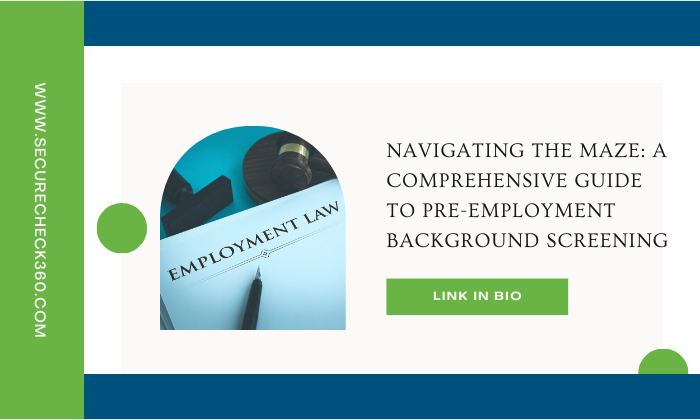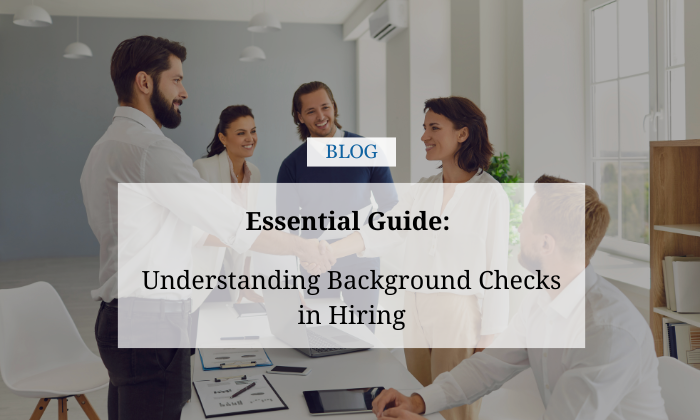As a business owner, I bet you’ve been through the ropes of hiring and letting go of team members. Finding the right people is a real challenge, especially with the current job market dynamics. Skipping pre-employment screenings might leave you with an employee who isn’t up for the job, doesn’t align with your team, or in a worst-case scenario, someone who poses a risk to your company, be it through incompetence or misconduct. It’s a crucial step to ensure you build a reliable and trustworthy team.
Reduce the risk of hiring mishaps by running background checks before extending job offers to candidates. This step unveils any information individuals might have omitted or misrepresented during interviews, ensuring your company invests in individuals with integrity and honesty. It’s a smart move to build a team of trustworthy professionals.
What Is Pre-Employment Screening?
Pre-employment screening dives into a potential employee’s background, encompassing personal history, education, and additional components like criminal record checks or drug tests. The primary aim is to ensure that the person you hire aligns well with your organization’s values. Beyond that, it serves as a safeguard against potential lawsuits, employee theft, and shields your brand’s reputation. Navigating the screening process can be complex, given the multitude of options available.
It’s challenging to determine the right testing for your business. That’s where Securecheck360 steps in, aiming to simplify and guide you through the screening journey!
Work with a background check provider like Securecheck360
Here at Securecheck360, we’re experts in delivering reliable, fast turnaround and affordable Employment Background Screening Services, serving businesses of all sizes across the globe. Our customized solutions are finely tuned to meet the unique requirements of small, mid-sized, and large organizations. We’re dedicated to equipping companies with the vital tools and insights they need to make well-informed hiring choices. As one of the leading background verification companies, we’re committed to supporting even small businesses as trusted background check companies for small businesses to ensure they have the confidence to build the best teams for their success.
To know more about our services, book your free demo today!
Why Is Pre-Employment Screening Important?
Employers opt for pre-employment screening to ensure a safe and harmonious workplace. This involves evaluating candidates’ abilities, behaviors, and potential impact on company operations. The aim is to avoid hiring individuals who might bring negative attention or disruptions. Beyond checking criminal records, employers may review credit scores and employment histories to gauge reliability and financial stability.
Crucially, pre-employment screening should be a mutually protective measure for both the company and the applicant. To navigate this process effectively, employers must be aware of legal boundaries regarding information requests, respecting candidates’ privacy. Questions posed during screening should strike a balance neither overly personal nor invasive and align with confidentiality laws in the respective state. It’s about fostering a fair and respectful hiring process for everyone involved.
What is covered in a pre-employment background check?
A typical background check relies on a person’s name, birthday, and social security number to compile information from various public and private databases. Reputable background check providers can access these sources, presenting employers with a comprehensive and easy-to-understand report on the applicant.
Key components of a pre-employment background check often include:
- Identity Verification: Confirming accurate personal details, citizenship, and the right to work in the country.
- Criminal History: Investigating convictions, probation, outstanding warrants, or inclusion in registries or watchlists.
- Employment History: Verifying past employment details to ensure accuracy in the provided work history.
- Education Background: Authenticating universities and degrees mentioned on the candidate’s resume.
- Government-Issued Licenses: Confirming licensure for roles requiring specific credentials, such as CPA, teaching, or medical licenses.
- Motor Vehicle Records: Examining accident history and citations for positions involving driving responsibilities.
- Credit Check: Assessing financial responsibility, particularly crucial for roles handling budgets or company funds.
A pre-employment background check serves as a vital tool to ensure honesty and assess a candidate’s history. Employers can enhance the standard report by contacting previous employers and references, possibly reviewing public social media accounts for additional insights. The more comprehensive the information gathered, the greater the confidence in making the right hiring decision.
Legal Considerations During Pre-Employment Screening
Navigating the legal landscape of pre-employment screening is a crucial aspect of the process. Certain industries, like healthcare, government, education, and roles involving children, demand thorough screening and background checks.
The Equal Employment Opportunity Commission (EEOC) oversees federal discrimination laws, and many states have their own regulations. Employers need to be aware of both to ensure compliance. As an employer, you could be held accountable for damages resulting from a lawsuit filed by an applicant who perceives unfair treatment in the hiring process.
Understanding what’s legally permissible during pre-employment screening is equally important. For instance, if an applicant has been arrested without charges or convictions, it’s inappropriate to inquire about their arrest record on an application form. However, during in-person interviews, employers retain the right to discuss convictions and even arrests within legal bounds. Staying informed and following the right procedures is not just good practice but also ensures a fair and lawful hiring process.
Conclusion
Pre-employment screening is not just about gathering information but navigating legal complexities and industry-specific needs. Balancing thoroughness with respect for privacy, employers must be well-versed in federal and state regulations, with the EEOC serving as a guiding authority. A fair and transparent hiring process, rooted in awareness and prudence, not only mitigates risks but also ensures the formation of a trustworthy workforce.







